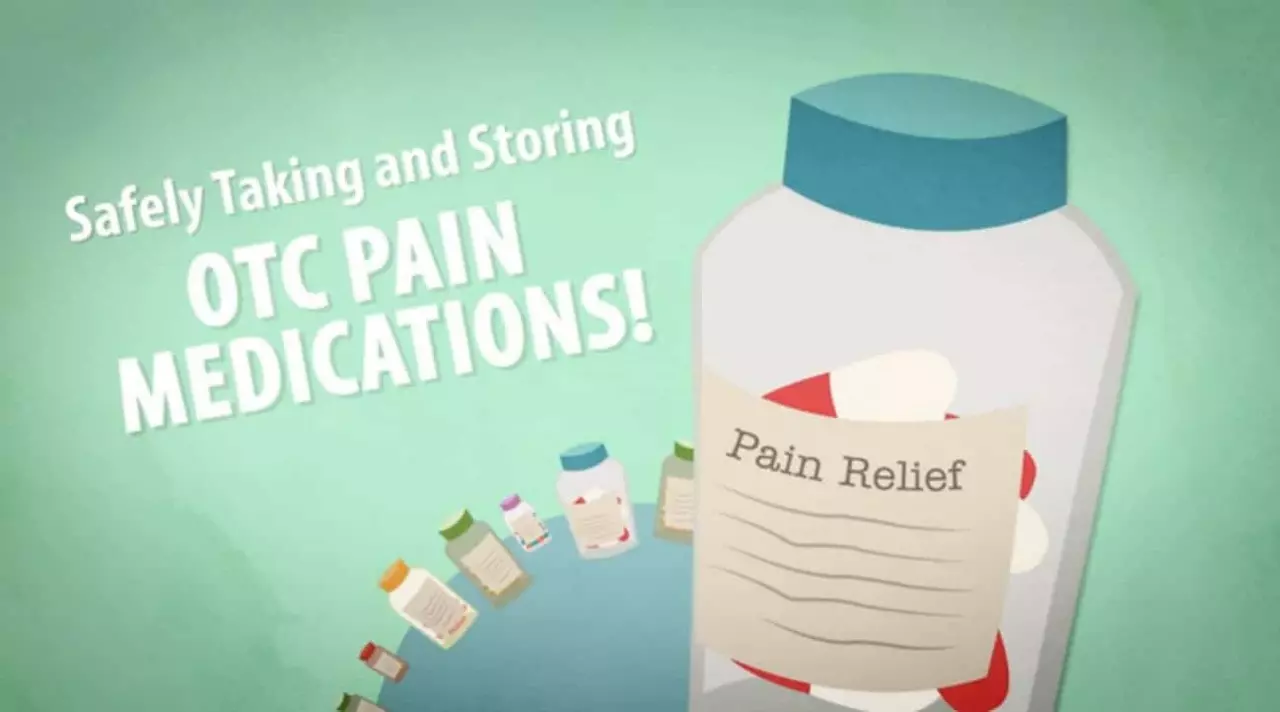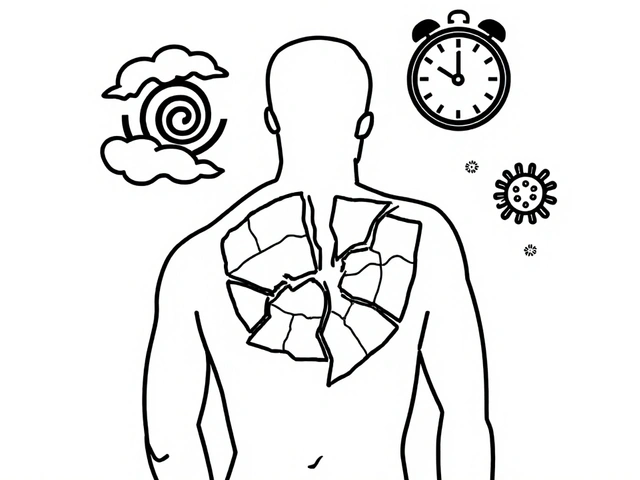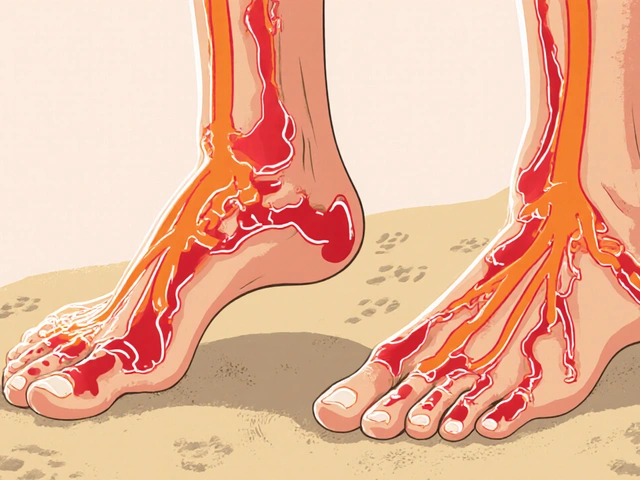How to safely store and dispose of butylscopolamine

- Colin Hurd
- 28 May 2023
- 14 Comments
Understanding Butylscopolamine and Its Uses
Butylscopolamine, also known as hyoscine butylbromide or simply Buscopan, is an antispasmodic medication commonly used to treat abdominal pain and cramps caused by conditions like irritable bowel syndrome (IBS). It works by relaxing the smooth muscles in the gastrointestinal tract, which helps alleviate pain and discomfort. As someone who has experienced these symptoms firsthand, I want to share with you how to safely store and dispose of butylscopolamine.
Proper Storage Conditions for Butylscopolamine
First and foremost, it's crucial to store your medication correctly to ensure its effectiveness and prevent any potential harm. When it comes to butylscopolamine, you should keep the tablets in their original container, as it provides protection from light and moisture. Always store the medication at room temperature, ideally between 68°F and 77°F (20°C and 25°C). Avoid exposing the tablets to high temperatures, direct sunlight, or damp environments, such as bathrooms or kitchens.
Keeping Butylscopolamine Away from Children and Pets
As a responsible adult, it's essential to keep all medications, including butylscopolamine, out of reach of children and pets. Make sure to store it in a safe place, like a high cabinet or a locked drawer, to prevent any accidental ingestion. Remember that what may be a helpful medication for you could be harmful or even lethal to a child or pet.
Checking the Expiration Date
Before taking any medication, always check the expiration date printed on the package. Expired medication can be less effective or even harmful, so it's crucial to ensure that your butylscopolamine is still safe to take. If you find that your medication has expired, do not use it and follow the disposal guidelines provided later in this article.
Proper Disposal of Unused or Expired Butylscopolamine
Disposing of unused or expired medication is just as important as proper storage. It's essential to follow the appropriate guidelines to prevent harm to the environment or accidental ingestion by others. The first step in disposing of butylscopolamine is to check the medication's packaging or patient information leaflet for specific disposal instructions. If there are no disposal directions provided, you can follow the general guidelines I've outlined below.
Medication Take-Back Programs
One of the safest ways to dispose of unused or expired butylscopolamine is to participate in a medication take-back program. These programs are organized by pharmacies, local governments, or healthcare organizations and provide a secure way to dispose of your medication. You can check with your local pharmacy or search online for a take-back program near you.
Disposing of Butylscopolamine in Household Trash
If a medication take-back program is not available in your area, you can dispose of butylscopolamine in your household trash by following these steps:
- Remove the tablets from their original container and mix them with an undesirable substance, such as used coffee grounds or kitty litter. This makes the medication less appealing to children, pets, and those who might intentionally misuse it.
- Place the mixture in a sealable plastic bag or another container to prevent leakage.
- Dispose of the sealed container in your household trash.
Remember not to flush butylscopolamine down the toilet or pour it down the sink, as this can contaminate the water supply and harm the environment.
Recycling Medication Containers
Once you've safely disposed of the medication itself, consider recycling the empty container. Remove any personal information from the label by either peeling it off or using a marker to black out your details. Check with your local recycling facility to see if they accept medication containers, as recycling guidelines may vary depending on your location.
Being a Responsible Butylscopolamine User
In conclusion, knowing how to safely store and dispose of butylscopolamine is essential for both your health and the well-being of those around you. By following the guidelines outlined in this article, you can ensure that your medication remains effective and doesn't pose any risks to others or the environment. Remember, always consult your healthcare provider if you have any questions or concerns about your medication.




Comments
Elizabeth González
It is commendable that the author delineates clear storage parameters, particularly the emphasis on temperature control and original packaging. Maintaining the medication at 20‑25 °C mitigates degradation of the active compound. Moreover, securing the tablets away from children and pets aligns with best practices in pharmacological safety. The guidance provided reflects a thorough understanding of drug stability considerations.
May 28, 2023 AT 01:11
chioma uche
The government should enforce stricter penalties for anyone caught flinging away meds like butylscopolamine in ordinary trash! It is a national disgrace that some people think they can ignore proper disposal just because they are lazy. Our local authorities must step up and provide free take‑back points in every community, otherwise we are endangering our children and our wildlife. This is not a suggestion; it is a demand.
June 1, 2023 AT 10:55
Satyabhan Singh
From a pharmacological perspective, the exposition on butylscopolamine adheres to the principles of pharmaceutical jurisprudence prevalent in India as well as globally. The exposition regarding the avoidance of exposure to light and moisture is consistent with the United States Pharmacopeia (USP) guidelines. Additionally, the counsel to verify expiration dates resonates with the regulatory obligations inscribed in the Drugs and Cosmetics Act. I commend the author for integrating these statutory references.
June 5, 2023 AT 20:38
Keith Laser
Wow, thanks for the masterclass on how to keep your pills away from the dog and the dishwasher. I guess I’ll just stash my medicine in the top‑shelf of my fridge now, right next to the ice cream – nothing says "safe" like a cold biscuit. And if you’re really feeling adventurous, you can always sprinkle the tablets with coffee grounds, because who doesn’t love a good latte‑infused pill?
June 10, 2023 AT 06:21
Winnie Chan
Seriously, the take‑back program tip is gold. I’m half‑sure my apartment complex will start a paper‑plane competition for who can deliver the most pills to the pharmacy. And hey, if the trash method is all you’ve got, just remember to add a dash of cat litter – it’s practically a spa day for your meds.
June 14, 2023 AT 16:05
Kyle Rensmeyer
People think the government will just let them dump drugs in the trash yay lol but what they dont know is the pharma industry is in cahoots with big pharma to keep us dirty 🤔 they hide the real disposal method in fine print and we fall for it :)
June 19, 2023 AT 01:48
Rod Maine
tHis ArTiClE iS sUpEr sIlLy.
June 23, 2023 AT 11:31
Othilie Kaestner
Honestly, who cares about take‑back programs? They’re just fancy ways for governments to control us. I’d rather just toss the pills in the bin and let the soil take its course. If anyone thinks otherwise, they’re just scared of a little waste.
June 27, 2023 AT 21:15
Sebastian Samuel
Listen up, folks! You need to follow the disposal steps exactly or you’ll be cursed by the medication spirits 😈. Mix the pills with coffee grounds, seal the bag, and throw it away. No excuses. 🚀
July 2, 2023 AT 06:58
Mitchell Awisus
Great post! I especially appreciate the clear bullet‑point format; it makes the information highly accessible, and the step‑by‑step instructions are invaluable. As a community member, I will share this with my family, and I encourage others to do the same; safety is a collective responsibility.
July 6, 2023 AT 16:41
Annette Smith
This is easy to read. Keep meds in the bottle, lock the drawer, and mix with coffee grounds if you need to throw them away.
July 11, 2023 AT 02:25
beth shell
I agree with the advice. Proper storage and disposal protect everyone. Let’s all be careful.
July 15, 2023 AT 12:08
khushali kothari
From an interdisciplinary pharmacokinetic and toxicological standpoint, the procedural directives articulated herein merit rigorous scholarly consideration. The precept of maintaining ambient temperature within a 20–25 °C corridor is consonant with the Arrhenius equation, which predicts degradation kinetics under thermal stress. Moreover, the exigency of preserving the dosage form in its original amber‑hued container mitigates photolytic cleavage pathways, thereby preserving the quaternary ammonium moiety intrinsic to butylscopolamine’s molecular architecture. The manuscript astutely underscores the principle of pediatric and veterinary sequestration, a practice substantiated by epidemiological data linking inadvertent ingestion to morbidity clusters in pediatric cohorts. By advocating for high‑cabinet storage or encrypted lockbox deployment, the author aligns with the Pediatric Safety Act stipulations, which mandatorily prescribe hierarchical access controls for Schedule III therapeutics. The discourse on expiration monitoring is particularly salient; the temporal decay of the bromide counter‑ion can engender a shift in pKa, attenuating the drug’s antispasmodic efficacy. Consequently, the procedural recommendation to execute pre‑administration Texp verification is methodologically sound. In the realm of waste management, the hierarchical disposal schema-namely, participation in pharmaceutical take‑back initiatives, followed by controlled household segregation-reflects compliance with the EPA’s Best Management Practices for Hazardous Pharmaceutical Waste. The utilization of sorptive matrices such as activated carbon lagged within coffee grounds or feline litter operates as a physical sequestration technique, abating the bioavailability of residual active pharmaceutical ingredients (APIs) upon landfill ingress. It is imperative, however, to integrate isotopic tracer studies to quantify the leaching potential of butylscopolamine derivatives within municipal solid waste matrices, thereby informing future regulatory frameworks. Finally, the guidance to excise personal identifiers from recycling containers constitutes adherence to HIPAA privacy safeguards, precluding inadvertent data exposure. In summation, the author furnishes a comprehensive, evidence‑based protocol that synthesizes pharmacological stewardship with environmental custodianship, thereby advancing the praxis of responsible medication governance.
July 19, 2023 AT 21:51
Brandon Smith
While the previous exposition is impressively thorough, it neglects the moral imperative to prioritize patient safety above bureaucratic convenience. Encouraging pharmacists to implement take‑back programs should be a legal requirement, not an optional recommendation. Moreover, the suggestion to mix pills with coffee grounds, although pragmatic, risks normalizing informal disposal methods that could be abused. Society bears a duty to enforce stringent disposal regulations to safeguard both public health and ecological integrity.
July 24, 2023 AT 01:11